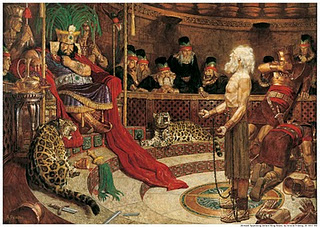In the reading block for this week I encountered the phrase "in the strength of the Lord". It is stated by Zeniff several times. Since my focus in this reading of the Book of Mormon is looking for references to the strengthening power of the atonement, this phrase seems important to understand.
Mosiah 9:17 "Yea, in the strength of the Lord did we go forth to battle against the Lamanites; for I and my people did cry mightily to the Lord that he would deliver us out of the hands of our enemies, for we were awakened to a remembrance of the deliverance of our fathers."
Two things in this scripture precede going forth with the strength of the Lord. Crying mightily infers a type of praying that employs great mortal strength. So, receiving His strength comes after applying all our strength, not towards controlling our situation, but towards reaching out to Him in supplication. We, in essence, are asking our Heavenly Father to supply us with strength we do not have.
The second element that comes before stepping out with God's strength is being awakened. When we wake up we go from an unconscious state to a conscious state, so waking up to remembering implies that our capacity to remember needs to be switched into an "on" position. When we consciously remember how our prayers have been answered in the past, how we were carried through trials, we then have an attitude which softens our heart and allows divine power to enter.
The story of King Noah is set in contrast to the story of his father, Zeniff.
Mosiah 11:19 "And now, because of this great victory they were lifted up in the pride of their hearts; they did boast in their own strength,"
Our own strength can bring us money, fame, power over others but that strength also comes with the sickness of pride. Pride is a disease which shortens our ability to understand reality. It thickens the walls of our heart so that we understand only our story. The thickening walls of pride can choke off the actual view of how things are, or how they were, or how they will become.
Mosiah 12: 26 "I say unto you, wo be unto you for perverting the ways of the Lord! For if ye understand these things ye have not taught them; therefore, ye have perverted the ways of the Lord. Ye have not applied your hearts to understanding; therefore, ye have not been wise. Therefore, what teach ye this people?"
Abinadi stands before the king and his priests and testifies of their lack of wisdom in using their own strength. Their power has brought down a whole group of people. The consequences of their actions will cause them to be trod upon by their enemies and the power they boasted of will be removed and they will become powerless. Abinadi demonstrates where lasting power originates.
Mosiah 13:6 "And he spake with power and authority from God; and he continued his words, saying: ...And moreover, I say unto you, that salvation doth not come by the law alone; and were it not for the atonement, which God himself shall make for the sins and iniquities of his people, that they must unavoidably perish, notwithstanding the law of Moses."
Why talk to this group about the atonement? Here is the mercy of God. After exposing our sins he teaches us about the Savior because there is no other way to survive spiritually. He teaches the sinner repentance because his power desires to strengthen not destroy. Noah's court is truly depraved and will ultimately destroy itself but among the group is a man who's heart is not entirely hard. The words of Abinadi will awaken him and he will turn around to embrace the Savior. Rejoice, at-one-ment will prevail.


No comments:
Post a Comment
What do you think?